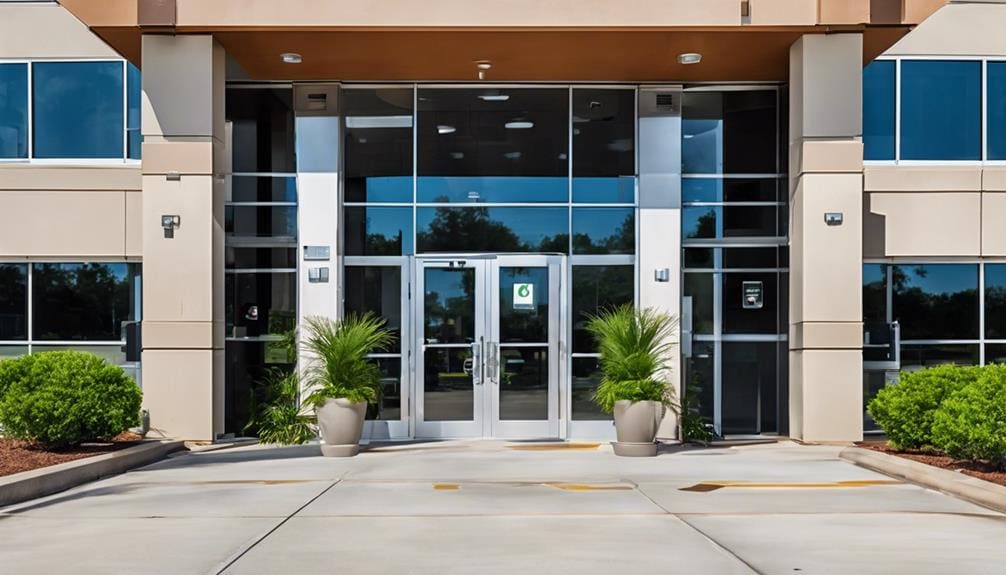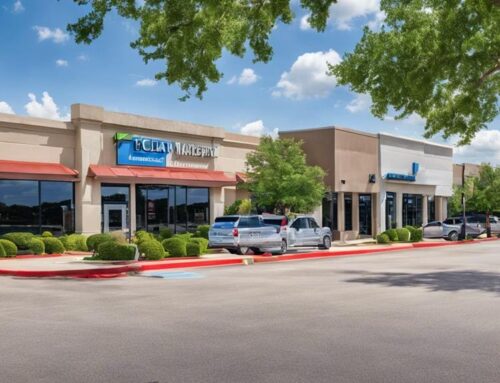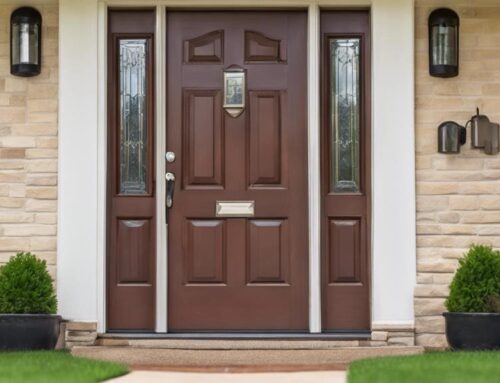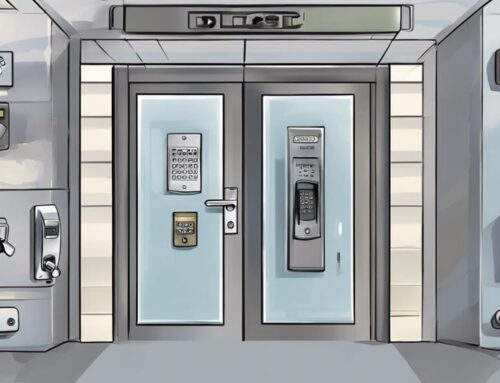To comply with Texas commercial door and lock regulations, follow these five key rules: First, ADA guidelines mandate locks and handles operable with one hand, mounted below 48 inches. Second, make sure door hardware is accessible and avoids traditional round doorknobs. Third, adhere to HIPAA standards by maintaining strict control over access to protected health information. Fourth, meet fire code regulations by using approved self-releasing door hardware and clearly marking key-locked deadbolts. Finally, employ expert locksmith services to maintain compliance and enhance security. These measures will help you stay compliant and guarantee a safe, inclusive environment for everyone.
Key Takeaways
- Ensure locks and handles are operable with one hand and avoid traditional round doorknobs.
- Mount all door hardware below 48 inches to ensure accessibility for individuals in wheelchairs.
- Install approved self-releasing door hardware to comply with fire code regulations and ensure safe evacuations.
- Implement strict security measures and regular maintenance to protect PHI and comply with HIPAA standards.
- Consult expert locksmith services to ensure compliance with all safety and legal standards, preventing liability.
ADA Door Lock Requirements
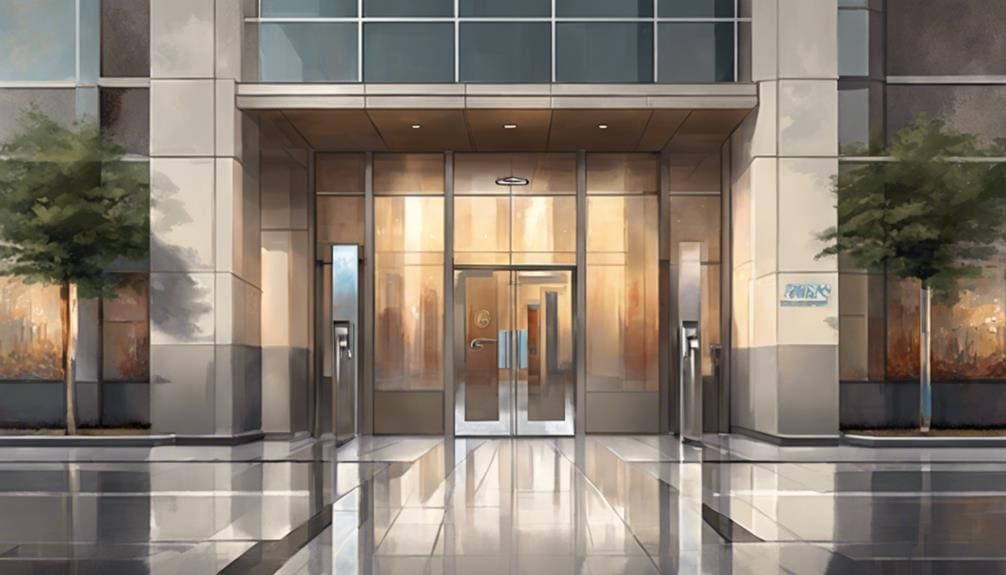
Ensuring adherence with ADA door lock requirements means that locks and handles must be operable with one hand and without the need for tight grasping or twisting. This is vital for making buildings accessible to everyone, including individuals with disabilities.
To meet these standards, you’ll need to avoid traditional round doorknobs, which require significant force and twisting. Instead, opt for lever-operated mechanisms, push locks, or panic bars, which are all ADA-compliant solutions.
Additionally, mounting the lock hardware below 48 inches above the floor is crucial for wheelchair accessibility. This height ensures that individuals using wheelchairs can easily reach and operate the locks.
Regarding inclusivity, remember that every detail counts. When someone feels excluded due to inaccessible environments, it impacts their sense of belonging.
Just as website accessibility is essential for an inclusive digital experience, physical accessibility in commercial spaces is equally significant. By following ADA guidelines for door locks, you’re not just complying with regulations; you’re fostering an environment where everyone feels welcome and valued.
It’s about more than just meeting standards – it’s about creating spaces where everyone can participate fully and independently.
Accessible Door Hardware

Adhering to ADA standards, accessible door hardware must be designed to guarantee ease of use for everyone, including those with disabilities. You need to make sure that the hardware is operable with one hand and doesn’t require tight grasping, pinching, or twisting of the wrist. Lever-operated, push, and panic bar door hardware are excellent options that comply with ADA requirements. Remember, traditional round doorknobs don’t meet these standards and should be avoided in commercial buildings.
Mounting the door lock hardware at the correct height is essential for accessibility. Specifically, it should be installed below 48 inches above the floor, making it accessible for individuals who use wheelchairs. This not only complies with ADA guidelines but also enhances the overall safety and usability of your facility.
When considering accessible door hardware, always align your choices with your organization’s Privacy Policy. This guarantees that while you’re providing accessibility, you’re also safeguarding the privacy and security of all users. Compliance with ADA guidelines isn’t just about meeting legal requirements; it’s about fostering an inclusive environment where everyone feels they belong.
HIPAA Lock Compliance
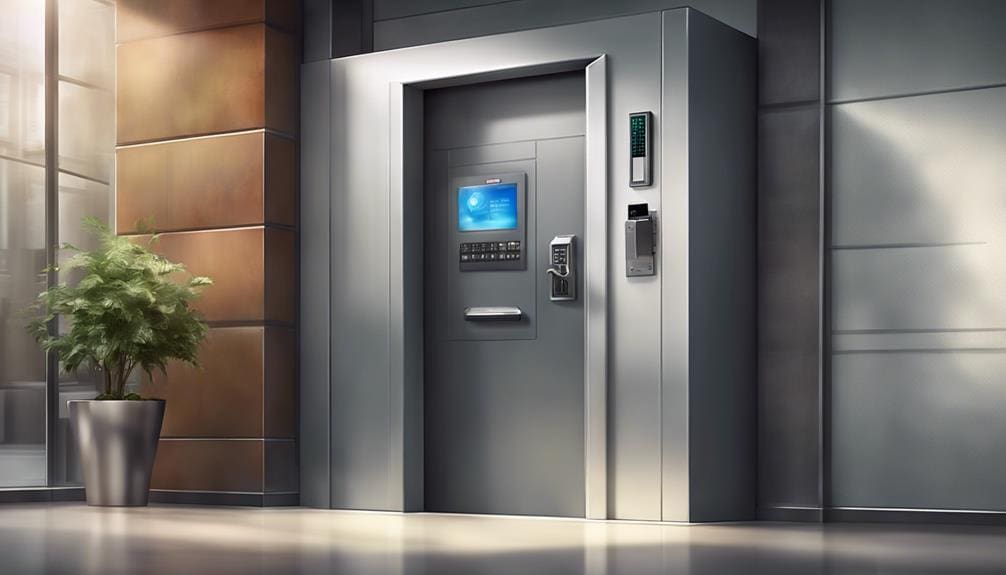
HIPAA lock compliance is vital for securing confidential patient information and guaranteeing that only authorized personnel have access to sensitive areas. As a healthcare facility, you must implement strict measures to restrict access to protected health information (PHI). Locks play an important role in upholding these standards. They should be robust and reliable, guaranteeing that unauthorized individuals can’t breach secure zones.
Regular testing and maintenance of door locks are crucial to maintaining HIPAA compliance. You should schedule periodic inspections to verify that all locks function correctly and meet regulatory standards. This prevents potential vulnerabilities that could compromise patient data.
Properly secured doors with compliant locks are your first line of defense against unauthorized access. They help guarantee that patient records remain confidential and accessible only to personnel who’ve legitimate reasons to view them. Neglecting these standards can lead to severe consequences, including hefty fines and legal ramifications.
Fire Code Regulations
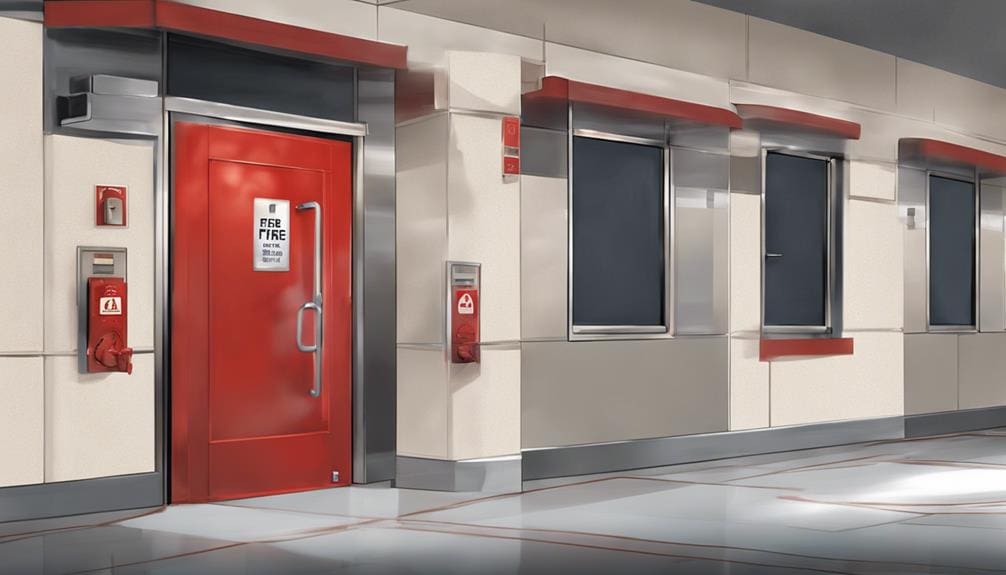
While maintaining HIPAA compliance is essential for safeguarding patient information, it’s equally important to confirm your commercial property meets fire code regulations for door hardware to guarantee occupant safety during emergencies.
In a commercial building, the fire code mandates specific door hardware to secure and facilitate efficient evacuation. Approved self-releasing door hardware, such as coded entry systems or interconnected locking mechanisms, are commonly required. These systems allow doors to open automatically during an emergency, facilitating a quick exit.
Key locked deadbolt locks may be allowed in certain occupancy groups, but they must be clearly marked with visible signage indicating their secured status. This ensures that anyone inside the building can recognize and operate the lock efficiently in an emergency.
Compliance with fire code regulations for door hardware isn’t just about legal adherence; it’s about creating a safe environment for everyone in your commercial building.
Expert Locksmith Services
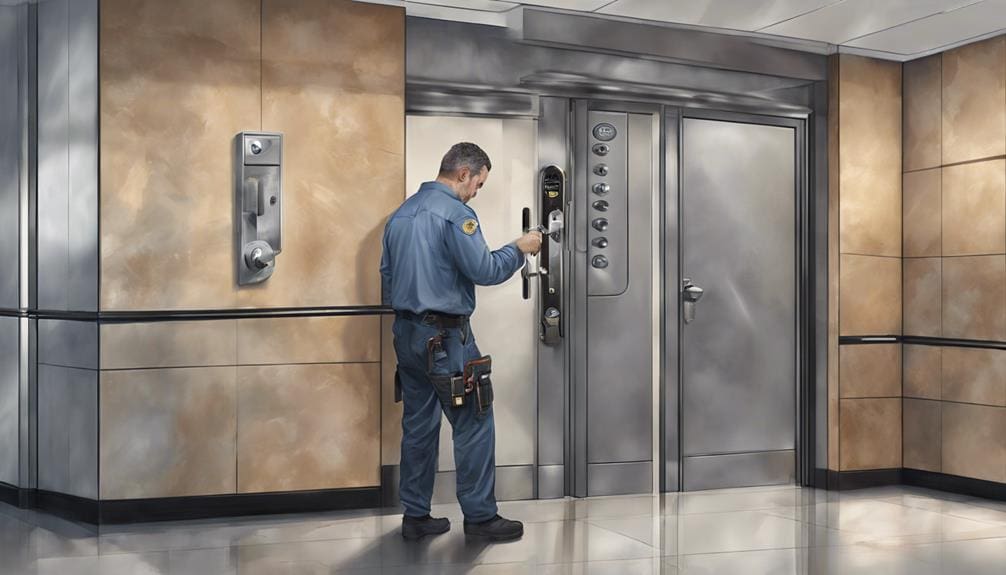
Expert locksmith services play a pivotal role in guaranteeing your commercial property meets ADA and HIPAA compliance standards while maintaining robust security for all entry and exit points. Locksmiths provide essential services that secure doors, emergency exits, and sensitive areas, making certain your property is up to code and safe for everyone.
When it comes to ADA compliance, locksmiths make certain that door hardware is accessible and operable by individuals with disabilities. For HIPAA compliance, securing areas with sensitive health information is critical. Proper locksmith services help mitigate risks, prevent liability, and guarantee legal adherence.
Low Rate Lockshop offers these expert locksmith services in Texas, Pennsylvania, Delaware, Maryland, and New Jersey. They provide free estimates to help you budget for necessary compliance upgrades, ensuring you get the precise services you need without unexpected costs.
Don’t overlook the importance of professional locksmith services in maintaining the safety and legality of your commercial property. Effective security measures aren’t just about protecting assets but also about creating an inclusive and compliant environment for everyone.
For tailored, expert services, call us today to schedule your free estimate and guarantee your property meets all required standards.
Frequently Asked Questions
What Are the ADA Requirements for Door Locks?
ADA requirements for door locks mandate that they’re operable with one hand and don’t need more than 5 lbs. of force to open. The lock hardware must be mounted below 48 inches to guarantee wheelchair accessibility.
Common compliant mechanisms include push, lever-operated, and panic bars. Traditional round doorknobs aren’t acceptable.
Meeting these standards guarantees everyone feels included and can easily access your building.
What Are Texas Accessibility Standards?
When it comes to Texas Accessibility Standards (TAS), you need to know the ins and outs to stay compliant. TAS guarantees buildings are accessible to everyone, covering doors, ramps, handrails, and more.
It aligns with the ADA to guarantee inclusivity and safety. Adhering to TAS isn’t just about avoiding penalties; it’s about opening doors for all and fostering a welcoming environment for customers and employees alike.
What Is the ADA Ramp Code in Texas?
You need to know the ADA ramp code in Texas to guarantee accessibility. The slope must be 1:12 for wheelchair access, and ramps should be at least 36 inches wide.
Handrails should stand between 34 and 38 inches high and be on both sides if the ramp exceeds 6 feet.
Don’t forget, landings at the top and bottom need to be at least 60 inches long for safety and comfort.
Is a Keyless Deadbolt Required in Texas?
No, a keyless deadbolt isn’t required in Texas, but consider its significant security and accessibility benefits. These devices deliver dependable defense, deterring unauthorized access while ensuring ease of entry for authorized personnel.
Installing keyless deadbolts can align with ADA guidelines, fostering a feeling of inclusivity and compliance. Though not mandatory, they’re a smart, strategic solution for enhancing commercial property protection and convenience in Texas.
Conclusion
By understanding Texas commercial door and lock compliance, you guarantee safety, accessibility, and legal adherence.
Did you know that 26% of Americans live with disabilities, highlighting the importance of ADA-compliant door hardware?
By following ADA requirements, HIPAA guidelines, and fire code regulations, you not only protect your business but also promote inclusivity.
Expert locksmith services offer precise solutions tailored to your needs, securing that your doors and locks meet all necessary standards effectively.

